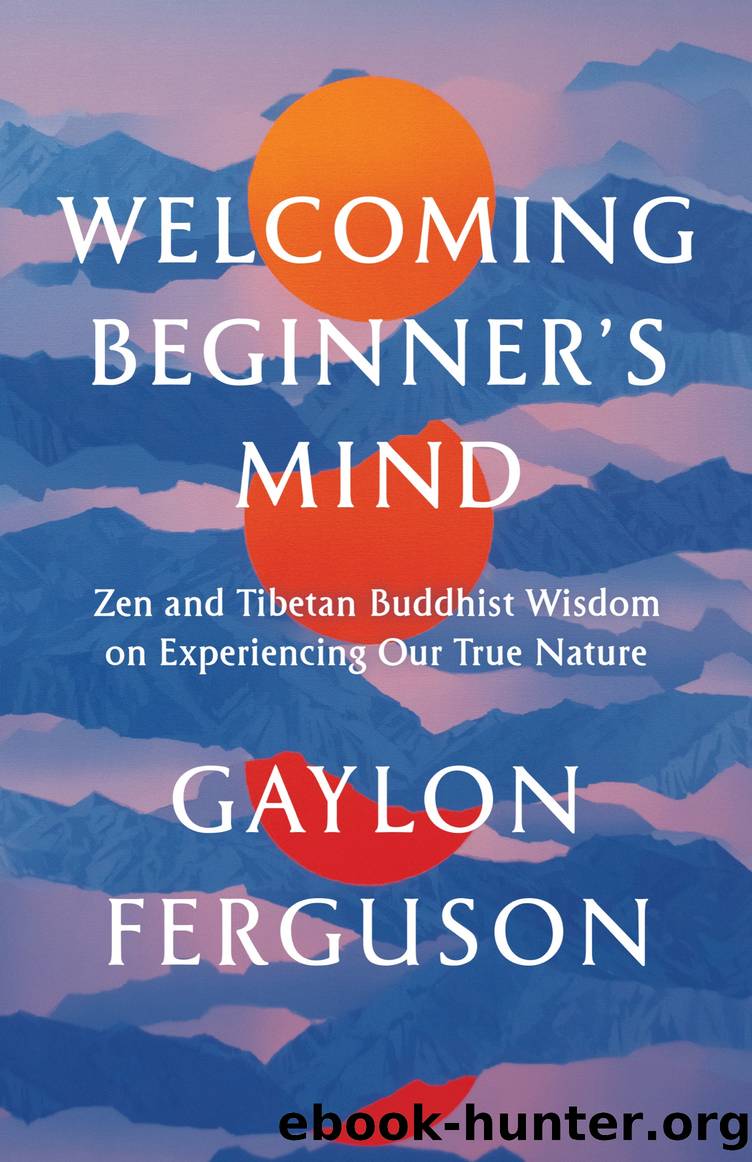Welcoming Beginner's Mind by Gaylon Ferguson

Author:Gaylon Ferguson [Ferguson, Gaylon]
Language: eng
Format: epub
Publisher: Shambhala
Published: 2024-03-26T00:00:00+00:00
7 | FORGETTING THE OX
The seventh image shows the oxherder resting peacefully at home. The awesome oxâand our long, painful seeking for that lost, wild animalâare both forgotten. As in the first stage, thereâs no ox to be seen anywhere, yet now thereâs no sense of lack. As Zen teacher Bartok Roshi asks, âWho can even remember what that search was for?â[1] Anxious seeking gives way to restful confidence. Here, we enjoy the freedom of nonstruggle, abandoning the rope and the whip. There is no need for the concept of taming an unruly other. There is no other. At the seventh stage, a delightful possibility quietly dawns in the night: maybe we are the ones weâve been searching for. Oxen are us.
PEACE IS THE courageous heart of this journey. Here, peace means original peace, the peace of our original nature. Sometimes peace arrives as a difficult achievement, the result of a series of hard-fought, bloody battles. Eventually one side emerges victoriousâuntil the other side regroups and launches another attack. To conquer through war is to live in the constant shadow of violent retribution. Original peace has no shadow. Itâs all-illuminating, like a brilliant sun that shines everywhere, all the time, on everyone. This is nonaggression as the essence of all paths, echoing the wise saying âThere is no way to peace; peace is the way.â
We first explored this experiential way in the Welcoming Exercise, raising a white flag of surrender to whatever arose as we sat still, doing nothing. We engaged this exercise in allowing welcoming to be all-welcoming. As it says in âOn Trust in the Heart,â an ancient Zen text, âIn its essence the Great Way is all-embracing.â[2] Welcoming is the modest expression, not the heroic attainment, of our fundamentally peaceful nature.
When we welcome experience, all our experience, just as it is, however it is, we find ourselves in intimate connection with ourselves and others around us. This intimacy was first suggested in the image of touching the ox at the fourth stage. Our oxherding journey continues in the direction of direct experience by shedding layer after layer of conceptual buffering. We let go of the idea of a goal of âawakeningâ to be gained in the future. This suggests a subtle shift in our relationship to experience both on and off the meditation cushion, one result of the experiential inquiry we began in the last chapter and will continue here. If we welcome others, even those we sometimes find irritating or annoying, we become the expansive hosts of our lives.
The practice of the tea ceremony (chado) elegantly expresses this attitude of open generosity. The host prepares the environment and then graciously invites us into a space of simplicity and warmth. Beyond words, the atmosphere itself seems like a silent invitation: âYou are welcome, just as you are. Please enjoy some tea.â Tea is a formal example of an attitude and practice for our everyday life. Welcoming is a gentle springboard into a life of inviting all living beings to be our guests.
Download
This site does not store any files on its server. We only index and link to content provided by other sites. Please contact the content providers to delete copyright contents if any and email us, we'll remove relevant links or contents immediately.
The Way of Zen by Alan W. Watts(6614)
Ego Is the Enemy by Ryan Holiday(5447)
The Art of Happiness by The Dalai Lama(4130)
The Book of Joy by Dalai Lama(3986)
Why Buddhism is True by Robert Wright(3452)
Spark Joy by Marie Kondo(3302)
Shift into Freedom by Loch Kelly(3199)
Happiness by Matthieu Ricard(3047)
A Monk's Guide to a Clean House and Mind by Shoukei Matsumoto(2915)
The Lost Art of Good Conversation by Sakyong Mipham(2654)
The Meaning of the Library by unknow(2571)
The Unfettered Mind: Writings from a Zen Master to a Master Swordsman by Takuan Soho(2311)
The Third Eye by T. Lobsang Rampa(2266)
Anthology by T J(2213)
Red Shambhala by Andrei Znamenski(2199)
The Diamond Cutter by Geshe Michael Roach(2061)
Thoughts Without A Thinker: Psychotherapy from a Buddhist Perspective by Epstein Mark(2025)
Twilight of Idols and Anti-Christ by Friedrich Nietzsche(1894)
Advice Not Given by Mark Epstein(1880)
